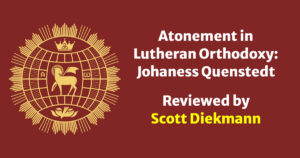When people talk about the Law, often they are ships passing in the night. They talk past each other.
At the surface, they seem to be disagreeing with each other, but they are not even talking about the same thing. When it is assumed at the superficial level that they are talking about the same thing but really are talking about different things, of course those different things make it sound like they are saying different things about one superficial subject. They could be saying different things about two different deeper subjects.
The question, “What is righteousness” is a single and superficial question. Before we can give a scriptural, Christian, and Lutheran answer, we must go at least one level deeper. Are we talking about righteous before God (coram Deo) or righteousness before the world (coram mundo)? Righteousness before God is one thing, and righteousness before the world is another. To speak truly about righteousness before God we will say one thing, but to speak truly about righteousness before the world we will say another thing, something different. We are not contradicting ourselves. We are simply talking about two different things, making two statements, one statement about one subject, and a different statement about a different subject.
But, when people talk about the Law, a majority perceives the discussion as being about only one thing, one righteousness, righteousness superficially, as if there were no difference between righteousness before God and righteousness before the world. One group of people assesses statements others make about the Law according whether those statements are true about righteousness before God. Another group assesses statements others make about the Law according whether those statement are true about righteousness before the world. Both groups assume they have covered the whole topic of righteousness when they have considered only one righteousness and not the other. Both groups believe they are assessing what others meant – which righteousness they were talking about – because they assume there is only one righteousness.
When a statement is not true about righteousness before God, superficial thinking never goes deep enough to consider whether the other person might have been talking about righteousness before the world, and whether, on that different subject, the statement could have been true. Similarly, when a statement is not true about righteousness before the world, superficial thinking never goes deep enough to consider whether the other person might have been talking about righteousness before God, and whether, on that different subject, the statement could have been true.
Righteousness before God is one thing. Righteousness before the world is another.
As Luther observes in On the Freedom of a Christian: “We conclude, therefore, that a Christian lives not in himself, but in Christ and the neighbor. He lives in Christ through faith, and in his neighbor through love.”[1]
Luther famously said, “A Christian is a perfectly free lord of all, subject to none. A Christian is a perfectly dutiful servant, subject to all.”[2] If there were only one righteousness, that would be an irreconcilable contradiction. But there are two.
Righteousness before God is by faith, not works, without the works of the Law. As to this, a Christian is a perfectly free lord of all, subject to none. That is one thing.
But righteousness before the world is not by faith. What good does it do your murder victim that you have faith in Christ for your righteousness before God? Your neighbor still is dead. You still murdered him. Righteousness before the world is through love, not faith. It is by the works of the Law because the Law commands love toward our neighbor. Against love there is no law. If you want to be righteous before the world, do not murder your neighbor. Do not plead your forgiveness before God by faith as grounds to go out and murder your neighbor.
To be righteous before God requires perfection. “Therefore you shall be perfect, just as your Father in heaven is perfect.” (Matthew 5:48) Only faith which receives the righteousness of Christ, which is perfect, can avail for perfection before God. While it would be best, were it possible, for our neighbor if we could obey the Law perfectly, we cannot attain perfections. But the inevitable imperfection of our keeping the Law is no reason not to try where our righteousness before the world is concerned. It still is better for our neighbor when we do better at obeying the Law rather than doing worse.
Forgiveness of sins by faith gives us righteousness before God, not license to hate our neighbor. As to righteousness before the world, a Christian is a perfectly dutiful servant, subject to all.
Suppose people are talking about the Law and someone says, “We should stop hating our neighbor.” If a hearer believes there is only one righteousness, the righteousness before God, he might object that the Law is not doable, that we cannot be justified by the deeds of the law. But has that hearer heard? What did the speaker say? Did he say, “To be righteous before God we need to stop hating our neighbor?” Or did he say, “To be righteous before the world, we need to stop hating our neighbor?”
Not every statement that we do need to obey the Law is a legalistic statement. If the statement is relating to our righteousness before the world, it could be a true, scriptural, Christian, Lutheran statement. A contrary statement that for righteousness before the world we need not obey the Law hates our neighbor. To violate the Second Table of the Law is hatred of our neighbor.
Not every statement that we need not obey the Law is an antinomian statement. If the statement is relating to our righteousness before God, it is a true, scriptural, Christian, Lutheran statement. A contrary statement that for righteousness before God we must obey the Law dishonors the Law by a false claim that we can keep it. That diminishes the Law to manageable and doable dimensions when the truth is, the dimensions of the Law’s demands are beyond all management or doing for righteousness before God. When we think we can keep the Law for righteousness before God, we have yet to hear the Law. All this is to say nothing of how that contrary statement also diminishes and dishonors both the person and work of Christ and his cross.
To move forward in our discussion of the Law, we must disambiguate what we are talking about. We must clarify which righteousness we are addressing in relation to the Law.
Not all Lutherans, but many, have a bad habit of assuming that there is no topic but justification. It is understandable. So much of the world including so much of the Church is deathly wrong about justification. The Lutheran doctrine of justification confessed in the confessional writings of the Book of Concord is a pure and trustworthy teaching according to Scripture. It is the center of Lutheran thought. It affects every other doctrine. It is right of Lutherans to be vigilant to safeguard the pure teaching of justification and to detect defections from it that the enemy of our souls sneaks in from so many directions. By the grace of God, many whose formal confessions of faith are defective about justification do not actually believe those confessions, but actually are trusting Christ alone, the Word alone, by faith alone for their justification.
But we Lutherans are wrong if we think that justification – our righteousness before God – is the only thing as distinct from the chief thing that God says in his Word. Scripture does teach, as Luther explains in the Fifth Commandment, “We should fear and love God so that we do not hurt or harm our neighbor in his body, but help and support him in every physical need.” Scripture does teach, as Luther explains in the Sixth Commandment, “We should fear and love God so that we lead a sexually pure and decent life in what we say and do, and husband and wife love and honor each other.” The same goes for each commandment of the Second Table of the Law. This is not for the sake of living in Christ, for the sake of our righteousness before God, for the sake of our standing in justification. We cannot do that by love. We do that only by faith. Rather, it is for the sake of living in our neighbor by love. It is for the sake of that other righteousness, the righteousness before the world.
Beware of kneejerk reactions to what other people say about the Law. Find out what they actually are saying. If they are saying either:
- There is only one righteousness. The righteousness before God and the righteousness before the world is the same thing.
- For righteousness before God, we need to obey the Law.
That is error and we should voice disagreement.
But if they are saying:
- We need to obey the Law, and this is only for the love of our neighbor, our righteousness before the world, not for righteousness before God.
There is a chance that their statement is true. We need to proceed to the next step to see what they are claiming the Law says we should do to love our neighbor. They could be right at the first, general step, but still slide off into error at the second, more specific step. But, sometimes people are right at both steps: they are talking about righteousness before the world, and they are right in what they are saying the Law commands for love of neighbor.
It will not do to incessantly imagine ourselves superior to others by always contradicting what they say about the Law for the sake of righteousness before the world as if they were speaking of righteousness before God or as if righteousness before God were the only righteousness., as if justification were the only teaching of Scripture. Oddly enough, that is its own kind of legalism.
[1] Jack D. Kilcrease, Holy Scripture (Fort Wayne, IN: The Luther Academy, 2020), 6, citing On the Freedom of a Christian, 1520 (AE 31:371`; WA 7:69).
[2] Martin Luther, On Christian Liberty, AE 31:344. In Latin: “Christianus homo omnium dominus est liberrimus, nulli subiectus. Christianus homo omnium servus est officiosissimus, omnibus subiectus.” WA VII:49. In German: “Eyn Christen mensch ist eyn freuer herr ueber alle ding und niemandt unterthan. Eyn Christen mensch ist eyn dienstpar knecht aller ding und yderman unterthan.” WA VII: 21.




